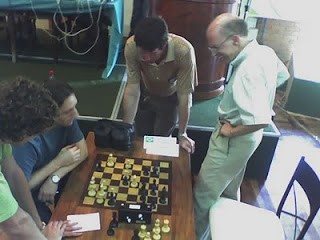
In 1977 Henrique Mecking was the world's third player, behind Anatoly Karpov and Viktor Korchnoi. The Brazilian chess site
Rádio Xadrez's Blog (Radio Chess's Blog) recently did a profile article and interview with the legendary Brazilian chess player, and allowed us to cross-post it here. Enjoy!
By Tiago Santos/Radio XadrezThe soccer, as we know it nowadays, was invented in England, in 1848. However, its mastery hasn't taken too much time to spread all over the world and, nowadays, there are good players either in Europe or in the other continents, especially in South America. With chess, though, the situation was not alike: invented in the East, the history of this fascinating sport of the boards shows a dominance of European and Asian countries, especially in the Era of the geniuses from USSR, from Alexander Alekhine to Boris Spassky.

1970: Maracanã, Brazil
Remarkable names of chess from the Western side are just a few, compared to the others. Between them, we could mention
Paul Morphy (USA),
José Raul Capablanca (CUB) and
Bobby Fischer (USA). There is also a name which, curiously, comes from a country which the main sport is the soccer:
Henrique Costa Mecking, the Brazilian genius better known as
Mequinho.This week, Henrique Mecking, today with 58 years old, took part of
Rádio Xadrez's podcast - a Brazilian blog of interviews, among them one with
WGM Nathalia Pogonina - and told a little bit about his career and his future plans (read below some interview extracts).
Pelé of the chessboardsSouth-American, the first youngest International Master in history (at 15, in 1967) and a strong player in the 1970's, Mecking has never been a world champion, but had such a good performance that became the third place in FIDE world rankings - only behind the world champion and the vice world champion at the time,
Anatoly Karpov and
Viktor Korchnoi, respectively.

Veja Magazine, August 1973 | fac-simile
He was so popular that, in his country, he was compared to
Pelé (in soccer) and
Emerson Fittipaldi (in the F1). Also, he had his face in the covers of many magazines and newspapers, like Veja magazine, the one which sales more in Brazil (see image). His prestige was such that his name turned into song lyrics, composed by the rock singer
Raul Seixas and the writer
Paulo Coelho. He had even the governor's support at the time, who always met him after his triumphs at the boards.He won twice the Interzonal Tournament, which gave him a place at the World Championship cycle, in Petropolis 1973 (Brazil) and Manilla 1976 (Philippines), ahead of names such as
Boris Spassky,
Vassily Smyslov,
Efim Geller,
Lajos Portisch,
Lev Polugaevsky,
Vlastimil Hort and D
avid Bronstein. His matches against sovietic players excited so much the world that, after 30 years had passed, when they had the opportunity to meet him, in Netherlands 2009, players of the caliber of
Vassily Ivanchuk (UKR),
Levon Aronian (ARM) and
David Navara (CZE) looked for him to comment on his famous matches against Korchnoi (Augusta 1974) and Polugaevsky (Luzern 1977) in the Candidates Tournament. "I grew up studying his games", Ivanchuk would have said to him at that time.
The Next FischerWhen Mecking was at his peak, Bobby Fischer had already quit and some had even said that he was the "next Fischer". Against the North-American he played twice: a draw, when he was only an International Master, and a loss. They would play a match, in Argentina, but negotiations failed and the encounter never happened.
"I went to the hotel where Fischer was every day, but, I can't explain why, we never finished the negotiations for the match to take place", Mecking once said.He was polemic, made controversial statements and accused the system which determined the World Champion at that time to favors the soviets (something Fischer also did). Maybe due to this, the Russians criticized him much, as a way to affect him psychologically. Before his match in Augusta against Viktor Korchnoi - who, at that time, still belonged to the URRS - ,
Tigran Petrosian and
Mikhail Tal gave interviews criticizing his game very much, something some other soviet players openly did as well.

With the ex-world champion Tigran Petrosian, there was a duel apart from all the others. The Armenian was, probably, one of Mecking's highest rivals. Petrosian constantly declared publically that Mecking's game was "too lively" and that the Brazilian didn't know the concept of weak squares. It is true that, when Mecking lost to Petrosian, he was only an International Master, and, even though, refused to take the draw in one of these losses.
"A Grandmaster came to me at that tournament and asked me: 'How come you dare refusing a draw against the ex-world champion?' That's why he wins so many games: because his opponents want to beat him", told Mecking.In fact, it took some time for Mecking to understand that, until when, years later, he played Petrosian and managed to draw.
"He was the only player in the world who had a score of 3-0 against me", remembers. After that, in their fourth encounter, even in a better position, Mecking accepted the draw offer made by the ex-champion.
"I thought with myself: ‘I can't lose to this man again!’”.His story corroborates a well-known phrase by Petrosian, who played in a positional style like few other players and was rarely beaten, inheriting the unfair nickname of "king of draws".
"They say my games could be more interesting. I could be more interesting... and also lose", Petrosian defended himself.
Rivalry with PetrosianSome critics claimed that the Soviet attacks against him were part of a psychological strategy to affect it because, after all, his victories against players of the Iron Curtain were impressive. The truth is that Tigran Petrosian did not care much to say its harsh views on the Brazilian, as in a 1972 interview in which he said:
"He [Mecking] is not a bad player. He can even play better, but I'm sure he'll never be world champion. Mainly for his way of thinking chess. Mecking does not understand, for example, the meaning of strong and weak squares. He also does not understand the depth of positions and I have doubts about his future in chess”.Petrosian's opinion about him remains tough, many years later. One of the most famous chess trainers and writers,
Mark Dvoretsky, talks about Mecking in his book
Secrets of opening Preparation - School of Future Champions vol. 2 (2007), pages 84-94:
"In situations like these [Polugaevsky 1-0 Mecking, Mar del Plata, 1971, after move 16], most cold and experienced defenders usually save the game, but what we see is the different category between the two players. Polugayevsky is mature and positional while Henrique Mecking...”The poisonous snakeEven
Garry Kasparov, in his series of books
My Great Predecessors cites an episode with the Brazilian player. In Volume 4 (2006), page 370 of his book dedicated to Bobby Fischer, in a section titled
"The Brazilian prodigy", Kasparov said: "Indeed, Mecking considered himself a disciple of Fischer and even imitated him, not in the way of playing, but in his outrageous statements. In any case, Fischer did not have a good opinion of the Brazilian prodigy:
"This tough guy once said: 'If Fischer lost to me, that would not damage his reputation at all!". He is a talker, I would just lose to him if I were bitten by a poisonous snake”.

Mecking in Romania, with GM Boris Spassky | Dan Pasarelu/Clubul Regilor
The controversies in his career did not stop there. In the article "Winning by Rook or by Crook" (2007) in the Washington Post, journalist Paul Hoffman said that "In 1972, when he faced former world champion Tigran Petrosian in the tournament in San Antonio, Mequinho discovered that he had to fight in and off the board. The Soviet grandmaster "was only silent when it was his turn to play. Every time I had to think he was poking at the table with the knee and the board with the elbow to shake the table. As if it was not enough to bother me, Petrosian also made noises, knocking coffee, and all with varying pace. And rolling a coin on the table”. Three times after complaining to the arbiters Mequinho decided to make noise when it was his turn to play. Petrosian calmly turned off his hearing aid and won the match”. Asked about the fact that in the interview to Rádio Xadrez, Mecking said he did not remember of any noise. Today, he follows the "charity of the Catholic faith" and prefers forgiveness to discord.
The game with TalHe lost very few times and excelled in calculations. In his curriculum, he has victories against former world champions Vassily Smyslov (twice) and Mikhail Tal. After losing to him, Mikhail Tal had confided: "
I played the first match of my life with Mecking and I hope it was not the last". But by a twist of fate,
"it was unfortunately the last", said Mecking. He also drew with Anatoly Karpov and
Mikhail Botvinnik, and has defeated Viktor Korchnoi only with 15 years old being just an International Master. He had favorable score against
Miguel Najdorf (variant of the famous Sicilian) and against
Oscar Panno, highly respected Argentine player, among others.

Photo gallery in Hotel Anibal, Linares (SPA) | Nadja Wittmann/Chessbase
His strength to calculate variants and his ability at the endings were his strengths. He also played extremely fast - his biography says that in Brazil, when he as a teenager, he played matches with 1 minute against 5 minutes of his opponents, and won almost all of them. An incident in one of his matches is reported in The Games of Anatoly Karpov, K. O'Connell and J. Adams, Pitman Publishing (1974): "In the game Mecking x Botterill
[Hastings, 1972, Mecking came in 2nd and made a GM norm at the time], both were running out of time, with 2 or 3 minutes to 8 moves each. Mecking pressed the button of the clock and kept his hand on it, not allowing the English to press it back. The arbiter did not see it and Botteril lost his temper, and two moves later, the game. Everyone was extremely indignant and Najdorf called Mecking "the bandit of the chessboards".The irony was that, thirty years later, Karpov defended him during a visit of the former champion to Brazil: "Mecking was at that time, the best player in the west side, after Fischer stopped playing. He lost some games in the middle game because he did not know certain traps that were common to the Soviets", Karpov told the Brazilian press.
The defeat for the diseaseAt the beginning of Rio de Janeiro's Interzonal in 1979, in which he could achieve his third straight victory in Interzonals, he followed medical advice and left the tournament after the 2nd round. It was then that, like Fischer, suddenly disappeared Mecking, succumbing to a mysterious disease called myasthenia gravis - which affects the nervous system and muscles.It seemed the end, his disease was incurable and he withdrew from the boards to fight for life. Even the doctors did not believed in his cure, but he managed do be cured, attributing his healing to the faith, which led him to convert himself to the Catholic religion. Over the next 12 years, he left chess aside, majored in theology and Catholic philosophy and practiced his faith fervently.When everyone thought his chess career was over, in a surprising move, he announced his return. He played matches against GMs
Predrag Nikolic (YUG) and
Yasser Seirawan (USA), on both he lost by a score of 3.5 to 2.5 - 5 draws and one defeat - and also against the strongest player in Brazil nowadays,
GM Giovanni Vescovi (1 victory, two defeats and three draws) and
GM Alexander Fier (1 win, 1 loss and 2 draws), and played several other tournaments. He had a difficult and slow comeback, as might be expected of any athlete after more than 10 years of inactivity, but who occasionally shows traces of the player he was in his peak.
The return to eliteAfter his return in 1991, he has represented Brazil in two Chess Olympiads (2002 and 2004), won the 2nd Festival of Lodi, Italy (2006), was Brazilian champion of blitz chess on the Internet (2008) and played the popular Corus Tournament in Holland (2009) - in this occasion, he won his match with the Indian
GM Krishnan Sasikiran, which had 2711-ELO at the time - as well as other international competitions in Romania and Argentina (2001), where he drew one more time against his former rival Viktor Korchnoi, and with the top-
GMs Nigel Short (ENG) and
Judit Polgar (HUN).Still, he hardly plays the strongest tournaments he could, like the Chess Olympiad (Mecking refused to be part of the Brazilian team the last three editions) and the Brazilian Championship, of which he has only two titles, won the only two times he played (the Brazilian top-winner, GM Giovanni Vescovi, for example, has seven titles).

Match: Korchnoi x Mecking (1974)
Mequinho used to play on Internet Chess Club (ICC), with the nickname Lorenzo - the name of a Catholic saint, of whom he is a devotee - being the top-ranked for more than 10 times. Mecking, however, avoided commenting on this subject.For one of the most experienced chess players from Brazil and six-time national champion, G
M Gilberto Milos Jr (who recently won the Iberia-American Championship 2010), Mecking is the best player of the late Brazilian history. When he was interviewed by
Rádio Xadrez, Milos said: "He plays the endings very well, I cannot say for what reason, but in fact he plays much better. He plays well not due to his coming from another generation, but due to a natural quality he has, as today
[GM Levon] Aronian is the best endings player in the World, and comes from a very new generation”.Today, with an obsessive belief in the case and facing the disbelief of the majority, Mecking says he will return to the top of the world, where today are Magnus Carlsen, Vladimir Kramnik, Vishy Anand and Veselin Topalov, to name a few. Mecking bets that his return to the top elite of the chess world will be
"a gift from God" and divides his time between praying and chess studying, to achieve the ultimate goal. He also promotes lectures and simultaneous exhibitions, of which he is proud to be undefeated for over 30 years.From 13 to 25 January 2011, Mequinho will have a new chance to show that his faith is right: he will take part in the very strong
Memorial Antonio Rocha 2011, in Campinas, São Paulo, Brazil, which will have the participation of GMs Giovanni Vescovi and
Rafael Leitão, from Brazil, in addition to the
GMs Sandro Mareco (ARG),
Diego Flores (ARG),
Andres Rodriguez (URU),
Oswaldo Zambrana (BOL) and other good players, totaling 14 participants. We shall wait and see if there really will be a miracle.
[Update CV: Mecking finished third, behind Leitao and Vescovi.]Interview with GM Henrique Mecking
(Click here to watch)Rádio Xadrez - How is your daily routine nowadays?Henrique Mecking - As many people already know, I had a very serious disease, 33 years ago, and I'm almost cured. Nowadays I do simultaneous exhibitions, lectures and also teach, apart of playing international tournaments or rapid tournaments. Also, I run and practice the karate alone. Summing up, I have been preparing myself in chess. Few days ago, I launched a book about my best games [
Henrique Mecking - The Chess of a Grandmaster] and this book will be sought by Brazilian chess players and will be published in other languages also. My first book,
How Jesus Christ saved my life, is already in its sixth edition in Brazil and was published in the Romanian language. In the last five matches I played against Grandmasters, I didn't lose any, won three and drew two.

Campinas, Brazil, 2011 - Memorial Antonio Rocha Christian van Riemsdijk
- Well, to begin answering this question, I loved chess. I had 18 years old, studying physics in college and invitations for tournaments came. I saw Grandmasters playing and I was eager to give up college, because I preferred chess rather than physics. Chess at that time was less developed in Brazil. So, there was no chance of my being exceptional in chess at that time. And I didn't live in São Paulo, where there is, naturally, the greatest economic potential of the country. Then, there were no practical chances for me to dedicate entirely to chess unless I had the support of someone strong. So he [
Brazil's President at the time - General Médici] gave me all the support to play chess, because he liked the sport very much.
Rádio Xadrez - In 2010 Chess Olympiad the Brazilian team had a very expressive result. Weren't you willing to be part of that team? HM - Yes, but it was not possible for me to play. I have a plan for my life and nothing makes me deviate from this plan. To any invitation I have, I pray, and ask Jesus for an answer, acting according to the orientation he gives me.
Rádio Xadrez - What plan is it?HM - I will be again one of the best players in the world. To God, everything is possible. Most people think I won't make it. The cure Jesus is giving me is progressive and I'm almost fine. In 1979, I was almost dying, couldn't chew, just ate liquid food, didn't have the power even to brush my teeth anymore, and today I'm almost cured and returning to chess. I'm 58 years old and, only by myself, I would never have the conditions to reach this level again. My age is only 10% of the obstacle. The rest of the disease I still have corresponds to 90% of reaching my goal. However, as soon as I'm totally cured, I believe I will be back on top. My rating will go up slowly and my strength of play will highly increase also.

At Corus in 2009
- Exactly. I was the third best player of the world. Many times, God wants to do thing no one believes, just for people to see that it was God that made it.
Rádio Xadrez - If we compare, for example, players that played at your time and still play nowadays, like Karpov and Korchnoi, they aren't really at the top 20 anymore...HM - No, wait a minute. Korchnoi is 21 years older than me, so this comparison doesn't exist. Six years ago, more or less, Korchnoi still managed to win international tournaments and played some brilliant games, but he is 21 years older than me.
Rádio Xadrez - Your first return, in the South-American Zone Tournament, in 1993, wasn't as satisfactory as you wished?HM - There was still some crisis from the disease at the time, as there still is today, but today's crisis are much weaker. The medicines I took were not enough to play, I was lost in almost every game. I lost 35 ELO points in that tournament, I couldn't play chess. I should have lost 50 points, there were three games that I would lose and, after perseveringly praying, Jesus saved me and I managed to draw. They were against Oscar Panno (ARG), Herman van Riemsdijk (BRA) and Jorge Egger (CHI).
Rádio Xadrez - This means that the other players prayed less than you did? HM - Each person has its own faith. Jesus said "ask and you shall receive", so I may ask. Naturally, Jesus gives what He wants. If He accepted all my wishes, I would already be the world champion.
Rádio Xadrez - But the wish to go back to the elite, did He accept? Going back to the world's top ten players?HM - More than top-ten! This that you said is too modest. Wasn't I number three? Let's give a practical example, in any other sport, if a player stays out of it for a long period, like Ronaldinho in soccer, the struggle to reach the initial level is much higher, and he goes back in a level below he was before.
Rádio Xadrez - World's number 1 nowadays, Magnus Carlsen, has been playing very well. Are you going to overcome him?HM - I'm not talking about Carlsen, Kramnik, Bareev or Vitiugov. I'm talking about everything as a whole. I'm a chess player committed with religion, I try to enhance my level in chess and look for holiness in religion. Chess must help religion and religion must help chess, they walk together.

The chess of a Grandmaster (book)
- As I said, we may ask and Jesus gives the grace He wants. When I was almost dying, there was a lady who had the gift of cure, who prayed for me, but she herself died of cancer. It's the grace Jesus wants, not the one I want. If it depended on me, I would never be sick and would win all my games. I have aversion of losing chess games, I hate it!
Rádio Xadrez - What do you feel when you lose?HM - A friend of mine said that there is a GM who suffers more than me when he loses, I was very happy to know that, I thought I was the one who suffered most. My desire is to switch off from everything, I don't want to think about the game, but many times I wake up thinking in the middle of the night, because I prepared for too much time and everything went wrong, I thought I would win the game and lost. There was an Argentine GM who said '
when someone takes a piece of mine is just as if someone stick a knife in my belly'. It's painful to do all that planning when nothing goes right.
Rádio Xadrez - Is there a special game for you?HM - Right away, the three times I beat former world champions. Once I beat Mikhail Tahl and twice Vassily Smyslov (one with the white pieces and the other with black). Others I could say: the one which I beat GM Sergei Fedorchuk (UKR), that gave me the title of Lodi tournament, in Italy (2006); the game I won, with black, in 1976's Interzonal tournament, in Phillipines, against GM Vitaly Tseshkovsky (URS) – this game decided the places of the Interzonal.
Rádio Xadrez - Is it true a legend that people tell about you that, some time ago, when your opponent said "I offer a draw", you answered "I propose you resign"?HM - Yes, this was back in 1965, when I was 13 years old. The opponent was the experienced player Olício Gadia, who was Brazilian Champion twice. The game had been suspended and he offered me a draw, but I think he was just making a joke, because he was already lost. Then I told him: 'I propose that you resign'. He really resigned. The papers of that time, in Rio de Janeiro, posted a photo of ours in the cover, with the phrase "
David beats Goliah".

Interview to Rádio Xadrez | Tiago Santos/Rádio Xadrez
- Once, someone told me that entered in a chess club in Moscow and saw Petrosian showing his three games that he had outplayed me. I don't remember and don't want to remember, because things like there I prefer to forget. But someone told me he was saying that I left weaknesses in the white or black squares, I don't remember now. In one of these games, I refused to take the draw, because I had white and I wanted to win. In the fourth time I played against him, I had black and was already a Grandmaster, in 1975, and then I had a better position but got the draw.
Rádio Xadrez - Were there misunderstandings between you two, off the board?HM - Nowadays I see things through the light of the Christian charity, so when people ask me about this, I prefer not to comment. Not so long ago, I was talking about the tournament I played in Holland, then I said
"this and that player were very polite with me" and then someone asked
"and that one?”. Then, at the same time, I couldn't hold myself and laughed out loud, because the other player of whom my friend had asked was the one who disturbed me the most, not only me, but all the other players also. He did illegal things, out of the rules. He was the one who disturbed the most. But I prefer not to talk about these things.
Rádio Xadrez - Will you be the third place in world rankings one more time?HM - Quite so. I hope that it will be a bit more. Everything is possible to God. What disturb my chess performance are my age and my disease. I asked to Jesus, many times, that he took off 15 years of my age and, nowadays, I ask something a little more difficult. Normally, when I shave, people give me much less years than I actually have. I believe Jesus will give me a worldwide evangelization mission and, to accomplish my task, it would be better that I was one of the best chess players in the world or even the better. And I'm waiting for it, my cure will come soon.
Rádio Xadrez - How old people say you are? 35?HM - No! Not 35. I'm 58 years old and generally people give me about 43. Fifteen years less than I have, when I'm shaved.
 Rádio Xadrez - What were your best results after you came back to the boards?HM
Rádio Xadrez - What were your best results after you came back to the boards?HM - At the Bled Olympiad, in Slovenia (2002), I won five games and drew three. Afterwards, in 2006, I won the Lodi tournament, in Italy, playing against four very strong Grandmasters: GM Evgeny Postny (ISR), GM Sergei Fedorchuk (UKR), GM Levente Vajda (ROM) and GM Constantin Lupulescu (ROM). I scored 3,5 points against them.
Rádio Xadrez - You were also Brazilian blitz champion on ICC. We know you play very well on that modality, have you beat any top player on the site? HM - When you ask any GM about ICC, they don't usually like to answer, because some have secret accounts and others don't. So I would like to not comment on that.
Rádio Xadrez - But we have heard that you got to play against GM Hikaru Nakamura (USA), is that true? Do you know him? HM - I know who he is.
Rádio Xadrez - And have you beat him on ICC? HM - I'm sorry! But I cannot answer those questions. Although I was #1 on ICC for ten times, with the username Lorenzo, in honor of St. Lawrence, one of my guarding saints.
Rádio Xadrez - Which upcoming tournaments will you play to demonstrate that strength you intent to achieve?HM - I'm not completely great yet, it will be something for the future, for when God wants it to be. I have a plan and that plan is to be completely cured first. I'm extremely busy preparing for Memorial Antonio Rocha, in Campinas, Brazil, and also doing simuls and releasing my book. I've been studying very hard, mas I have other stuff to do here where I live, like renewing my driver's license, which will expire at the end of the month, and other things I can't get away from.
Rádio Xadrez - Do you buy books about chess or is your collections already complete?HM - We always have to use books or internet to see the best games. The book that I just published is very good and I think that it will be useful to GM's, MI's, medium-level players and beginners. There's a lot of good games on it, it's everything there.
Rádio Xadrez - Do you follow international competitions? Do you watch the greatest players' games?HM - Of course, otherwise I wouldn't be able to play openings, middle games and endings. I'm really anxious, waiting for my recovery, and after that happens, it will be calmer to play. In 1970, I was a strong opponent, beat GM's game after game, and rarely lost, thanks goodness, because I hate losing. If I could get to that level again, it would be a God's blessing. The defeats will be rare.
Rádio Xadrez - Who is the best player in the world? Which one do you enjoy watching playing?HM - I'm not the type that admires players. Any player with a style similar to Kasparov's is good in my opinion. Petrosian's style is not my type.
Rádio Xadrez - Why do people say women are not as good players as men? Why is there no woman at the world-wide top-100 rating?HM - Because there is a bigger number of male players than female in all the countries.
Rádio Xadrez - But do female players play as good as male? You already had a draw game with the GM Judit Polgar (HUN), in a competition in Argentina (2001), and also lost a game to the GM Yifan Hou (CHN), on Corus Tournament (2009)…HM - Yes, but I played badly against the Chinese. The game was good for me. There were people that criticized my game, my Spanish Opening. There's nothing to do with it, I was in a good position. I was tired, exhausted, worried about my defeats. I feared losing 25 points and get the last position at the tournament. When the situation is not good, you have to avoid losing points.
Rádio Xadrez - A listener sent us a question, about an interview of yours he read in a newspaper, saying you found a way of never losing, just drawing. Is it true?HM - I don't remember this, but this is not possible. When you are playing against a Grandmaster, there is the chance of you losing. It's like being alive with the chance that you die.
Rádio Xadrez - So if both players play perfectly, will it be a draw or white outplay black because it has the first move?HM - Of course that if black doesn't make any mistake, it will never lose. Playing with white does not guarantee victory.
Rádio Xadrez - You met GMs Levon Aronian (ARM) and Vassily Ivanchuk (UKR) in Holland? Is it true that Ivanchuk wanted to study chess with you?HM - I talked a lot with Aronian in Holland, he treated me very well. With GM David Navara (CZE) also, we are friends, I send some e-mails to him sometimes. But with Ivanchuk, I already knew him. In this occasion that you mentioned, I was studying a line and he was walking with his second, GM Leon Hoyos (MEX), then I came to greet him, because I am very polite, and he thought that he could talk to me, but he couldn't because I was studying chess. I had a position on the board and I couldn't let him see it, so he couldn't enter in my bedroom.
The transcription and translation of the interview was made possible thanks to the efforts of some of the Rádio Xadrezreaders, which is highly appreciated.About Rádio Xadrez
Rádio Xadrez (Radio Chess) is a podcast of Blog Vida em Miniatura, in language Portuguese and translates for English or Spanish. Between yours respondents are WGM Natalia Pogonina (Russia), GM Giovanni Vescovi, GM Gilberto Milos Jr., GM Rafael Leitao, among others.
Rádio Xadrez is marked by fun and friendly tone, exploring the humor newsletter about chess, but also involved in giving quality information, referring to methods, training, and chess itself.Visit at
www.vidaemminiatura.blogspot.com/
 In 1977 Henrique Mecking was the world's third player, behind Anatoly Karpov and Viktor Korchnoi. The Brazilian chess site Rádio Xadrez's Blog (Radio Chess's Blog) recently did a profile article and interview with the legendary Brazilian chess player, and allowed us to cross-post it here. Enjoy!By Tiago Santos/Radio XadrezThe soccer, as we know it nowadays, was invented in England, in 1848. However, its mastery hasn't taken too much time to spread all over the world and, nowadays, there are good players either in Europe or in the other continents, especially in South America. With chess, though, the situation was not alike: invented in the East, the history of this fascinating sport of the boards shows a dominance of European and Asian countries, especially in the Era of the geniuses from USSR, from Alexander Alekhine to Boris Spassky.
In 1977 Henrique Mecking was the world's third player, behind Anatoly Karpov and Viktor Korchnoi. The Brazilian chess site Rádio Xadrez's Blog (Radio Chess's Blog) recently did a profile article and interview with the legendary Brazilian chess player, and allowed us to cross-post it here. Enjoy!By Tiago Santos/Radio XadrezThe soccer, as we know it nowadays, was invented in England, in 1848. However, its mastery hasn't taken too much time to spread all over the world and, nowadays, there are good players either in Europe or in the other continents, especially in South America. With chess, though, the situation was not alike: invented in the East, the history of this fascinating sport of the boards shows a dominance of European and Asian countries, especially in the Era of the geniuses from USSR, from Alexander Alekhine to Boris Spassky.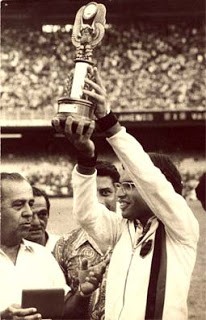

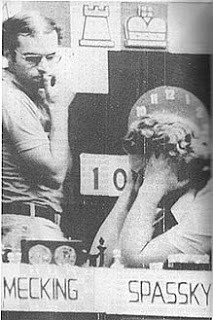 With the ex-world champion Tigran Petrosian, there was a duel apart from all the others. The Armenian was, probably, one of Mecking's highest rivals. Petrosian constantly declared publically that Mecking's game was "too lively" and that the Brazilian didn't know the concept of weak squares. It is true that, when Mecking lost to Petrosian, he was only an International Master, and, even though, refused to take the draw in one of these losses. "A Grandmaster came to me at that tournament and asked me: 'How come you dare refusing a draw against the ex-world champion?' That's why he wins so many games: because his opponents want to beat him", told Mecking.In fact, it took some time for Mecking to understand that, until when, years later, he played Petrosian and managed to draw. "He was the only player in the world who had a score of 3-0 against me", remembers. After that, in their fourth encounter, even in a better position, Mecking accepted the draw offer made by the ex-champion. "I thought with myself: ‘I can't lose to this man again!’”.His story corroborates a well-known phrase by Petrosian, who played in a positional style like few other players and was rarely beaten, inheriting the unfair nickname of "king of draws". "They say my games could be more interesting. I could be more interesting... and also lose", Petrosian defended himself.Rivalry with PetrosianSome critics claimed that the Soviet attacks against him were part of a psychological strategy to affect it because, after all, his victories against players of the Iron Curtain were impressive. The truth is that Tigran Petrosian did not care much to say its harsh views on the Brazilian, as in a 1972 interview in which he said: "He [Mecking] is not a bad player. He can even play better, but I'm sure he'll never be world champion. Mainly for his way of thinking chess. Mecking does not understand, for example, the meaning of strong and weak squares. He also does not understand the depth of positions and I have doubts about his future in chess”.Petrosian's opinion about him remains tough, many years later. One of the most famous chess trainers and writers, Mark Dvoretsky, talks about Mecking in his book Secrets of opening Preparation - School of Future Champions vol. 2 (2007), pages 84-94: "In situations like these [Polugaevsky 1-0 Mecking, Mar del Plata, 1971, after move 16], most cold and experienced defenders usually save the game, but what we see is the different category between the two players. Polugayevsky is mature and positional while Henrique Mecking...”The poisonous snakeEven Garry Kasparov, in his series of books My Great Predecessors cites an episode with the Brazilian player. In Volume 4 (2006), page 370 of his book dedicated to Bobby Fischer, in a section titled "The Brazilian prodigy", Kasparov said: "Indeed, Mecking considered himself a disciple of Fischer and even imitated him, not in the way of playing, but in his outrageous statements. In any case, Fischer did not have a good opinion of the Brazilian prodigy: "This tough guy once said: 'If Fischer lost to me, that would not damage his reputation at all!". He is a talker, I would just lose to him if I were bitten by a poisonous snake”.
With the ex-world champion Tigran Petrosian, there was a duel apart from all the others. The Armenian was, probably, one of Mecking's highest rivals. Petrosian constantly declared publically that Mecking's game was "too lively" and that the Brazilian didn't know the concept of weak squares. It is true that, when Mecking lost to Petrosian, he was only an International Master, and, even though, refused to take the draw in one of these losses. "A Grandmaster came to me at that tournament and asked me: 'How come you dare refusing a draw against the ex-world champion?' That's why he wins so many games: because his opponents want to beat him", told Mecking.In fact, it took some time for Mecking to understand that, until when, years later, he played Petrosian and managed to draw. "He was the only player in the world who had a score of 3-0 against me", remembers. After that, in their fourth encounter, even in a better position, Mecking accepted the draw offer made by the ex-champion. "I thought with myself: ‘I can't lose to this man again!’”.His story corroborates a well-known phrase by Petrosian, who played in a positional style like few other players and was rarely beaten, inheriting the unfair nickname of "king of draws". "They say my games could be more interesting. I could be more interesting... and also lose", Petrosian defended himself.Rivalry with PetrosianSome critics claimed that the Soviet attacks against him were part of a psychological strategy to affect it because, after all, his victories against players of the Iron Curtain were impressive. The truth is that Tigran Petrosian did not care much to say its harsh views on the Brazilian, as in a 1972 interview in which he said: "He [Mecking] is not a bad player. He can even play better, but I'm sure he'll never be world champion. Mainly for his way of thinking chess. Mecking does not understand, for example, the meaning of strong and weak squares. He also does not understand the depth of positions and I have doubts about his future in chess”.Petrosian's opinion about him remains tough, many years later. One of the most famous chess trainers and writers, Mark Dvoretsky, talks about Mecking in his book Secrets of opening Preparation - School of Future Champions vol. 2 (2007), pages 84-94: "In situations like these [Polugaevsky 1-0 Mecking, Mar del Plata, 1971, after move 16], most cold and experienced defenders usually save the game, but what we see is the different category between the two players. Polugayevsky is mature and positional while Henrique Mecking...”The poisonous snakeEven Garry Kasparov, in his series of books My Great Predecessors cites an episode with the Brazilian player. In Volume 4 (2006), page 370 of his book dedicated to Bobby Fischer, in a section titled "The Brazilian prodigy", Kasparov said: "Indeed, Mecking considered himself a disciple of Fischer and even imitated him, not in the way of playing, but in his outrageous statements. In any case, Fischer did not have a good opinion of the Brazilian prodigy: "This tough guy once said: 'If Fischer lost to me, that would not damage his reputation at all!". He is a talker, I would just lose to him if I were bitten by a poisonous snake”.
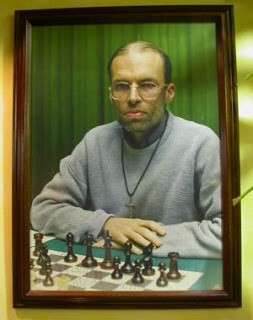
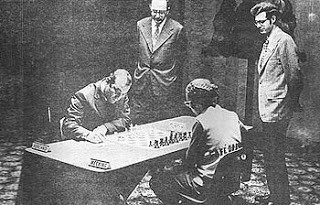


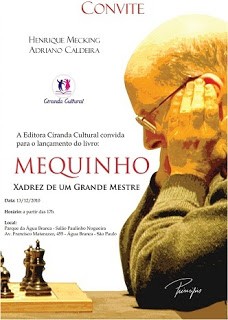
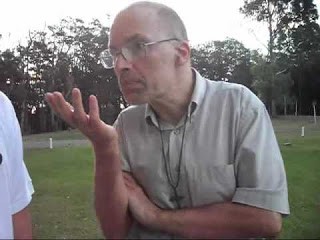
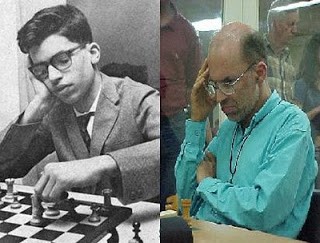 Rádio Xadrez - What were your best results after you came back to the boards?HM - At the Bled Olympiad, in Slovenia (2002), I won five games and drew three. Afterwards, in 2006, I won the Lodi tournament, in Italy, playing against four very strong Grandmasters: GM Evgeny Postny (ISR), GM Sergei Fedorchuk (UKR), GM Levente Vajda (ROM) and GM Constantin Lupulescu (ROM). I scored 3,5 points against them.Rádio Xadrez - You were also Brazilian blitz champion on ICC. We know you play very well on that modality, have you beat any top player on the site? HM - When you ask any GM about ICC, they don't usually like to answer, because some have secret accounts and others don't. So I would like to not comment on that.Rádio Xadrez - But we have heard that you got to play against GM Hikaru Nakamura (USA), is that true? Do you know him? HM - I know who he is.Rádio Xadrez - And have you beat him on ICC? HM - I'm sorry! But I cannot answer those questions. Although I was #1 on ICC for ten times, with the username Lorenzo, in honor of St. Lawrence, one of my guarding saints.Rádio Xadrez - Which upcoming tournaments will you play to demonstrate that strength you intent to achieve?HM - I'm not completely great yet, it will be something for the future, for when God wants it to be. I have a plan and that plan is to be completely cured first. I'm extremely busy preparing for Memorial Antonio Rocha, in Campinas, Brazil, and also doing simuls and releasing my book. I've been studying very hard, mas I have other stuff to do here where I live, like renewing my driver's license, which will expire at the end of the month, and other things I can't get away from.Rádio Xadrez - Do you buy books about chess or is your collections already complete?HM - We always have to use books or internet to see the best games. The book that I just published is very good and I think that it will be useful to GM's, MI's, medium-level players and beginners. There's a lot of good games on it, it's everything there.Rádio Xadrez - Do you follow international competitions? Do you watch the greatest players' games?HM - Of course, otherwise I wouldn't be able to play openings, middle games and endings. I'm really anxious, waiting for my recovery, and after that happens, it will be calmer to play. In 1970, I was a strong opponent, beat GM's game after game, and rarely lost, thanks goodness, because I hate losing. If I could get to that level again, it would be a God's blessing. The defeats will be rare.Rádio Xadrez - Who is the best player in the world? Which one do you enjoy watching playing?HM - I'm not the type that admires players. Any player with a style similar to Kasparov's is good in my opinion. Petrosian's style is not my type.
Rádio Xadrez - Why do people say women are not as good players as men? Why is there no woman at the world-wide top-100 rating?HM - Because there is a bigger number of male players than female in all the countries.Rádio Xadrez - But do female players play as good as male? You already had a draw game with the GM Judit Polgar (HUN), in a competition in Argentina (2001), and also lost a game to the GM Yifan Hou (CHN), on Corus Tournament (2009)…HM - Yes, but I played badly against the Chinese. The game was good for me. There were people that criticized my game, my Spanish Opening. There's nothing to do with it, I was in a good position. I was tired, exhausted, worried about my defeats. I feared losing 25 points and get the last position at the tournament. When the situation is not good, you have to avoid losing points.Rádio Xadrez - A listener sent us a question, about an interview of yours he read in a newspaper, saying you found a way of never losing, just drawing. Is it true?HM - I don't remember this, but this is not possible. When you are playing against a Grandmaster, there is the chance of you losing. It's like being alive with the chance that you die.Rádio Xadrez - So if both players play perfectly, will it be a draw or white outplay black because it has the first move?HM - Of course that if black doesn't make any mistake, it will never lose. Playing with white does not guarantee victory.Rádio Xadrez - You met GMs Levon Aronian (ARM) and Vassily Ivanchuk (UKR) in Holland? Is it true that Ivanchuk wanted to study chess with you?HM - I talked a lot with Aronian in Holland, he treated me very well. With GM David Navara (CZE) also, we are friends, I send some e-mails to him sometimes. But with Ivanchuk, I already knew him. In this occasion that you mentioned, I was studying a line and he was walking with his second, GM Leon Hoyos (MEX), then I came to greet him, because I am very polite, and he thought that he could talk to me, but he couldn't because I was studying chess. I had a position on the board and I couldn't let him see it, so he couldn't enter in my bedroom.The transcription and translation of the interview was made possible thanks to the efforts of some of the Rádio Xadrezreaders, which is highly appreciated.
Rádio Xadrez - What were your best results after you came back to the boards?HM - At the Bled Olympiad, in Slovenia (2002), I won five games and drew three. Afterwards, in 2006, I won the Lodi tournament, in Italy, playing against four very strong Grandmasters: GM Evgeny Postny (ISR), GM Sergei Fedorchuk (UKR), GM Levente Vajda (ROM) and GM Constantin Lupulescu (ROM). I scored 3,5 points against them.Rádio Xadrez - You were also Brazilian blitz champion on ICC. We know you play very well on that modality, have you beat any top player on the site? HM - When you ask any GM about ICC, they don't usually like to answer, because some have secret accounts and others don't. So I would like to not comment on that.Rádio Xadrez - But we have heard that you got to play against GM Hikaru Nakamura (USA), is that true? Do you know him? HM - I know who he is.Rádio Xadrez - And have you beat him on ICC? HM - I'm sorry! But I cannot answer those questions. Although I was #1 on ICC for ten times, with the username Lorenzo, in honor of St. Lawrence, one of my guarding saints.Rádio Xadrez - Which upcoming tournaments will you play to demonstrate that strength you intent to achieve?HM - I'm not completely great yet, it will be something for the future, for when God wants it to be. I have a plan and that plan is to be completely cured first. I'm extremely busy preparing for Memorial Antonio Rocha, in Campinas, Brazil, and also doing simuls and releasing my book. I've been studying very hard, mas I have other stuff to do here where I live, like renewing my driver's license, which will expire at the end of the month, and other things I can't get away from.Rádio Xadrez - Do you buy books about chess or is your collections already complete?HM - We always have to use books or internet to see the best games. The book that I just published is very good and I think that it will be useful to GM's, MI's, medium-level players and beginners. There's a lot of good games on it, it's everything there.Rádio Xadrez - Do you follow international competitions? Do you watch the greatest players' games?HM - Of course, otherwise I wouldn't be able to play openings, middle games and endings. I'm really anxious, waiting for my recovery, and after that happens, it will be calmer to play. In 1970, I was a strong opponent, beat GM's game after game, and rarely lost, thanks goodness, because I hate losing. If I could get to that level again, it would be a God's blessing. The defeats will be rare.Rádio Xadrez - Who is the best player in the world? Which one do you enjoy watching playing?HM - I'm not the type that admires players. Any player with a style similar to Kasparov's is good in my opinion. Petrosian's style is not my type.
Rádio Xadrez - Why do people say women are not as good players as men? Why is there no woman at the world-wide top-100 rating?HM - Because there is a bigger number of male players than female in all the countries.Rádio Xadrez - But do female players play as good as male? You already had a draw game with the GM Judit Polgar (HUN), in a competition in Argentina (2001), and also lost a game to the GM Yifan Hou (CHN), on Corus Tournament (2009)…HM - Yes, but I played badly against the Chinese. The game was good for me. There were people that criticized my game, my Spanish Opening. There's nothing to do with it, I was in a good position. I was tired, exhausted, worried about my defeats. I feared losing 25 points and get the last position at the tournament. When the situation is not good, you have to avoid losing points.Rádio Xadrez - A listener sent us a question, about an interview of yours he read in a newspaper, saying you found a way of never losing, just drawing. Is it true?HM - I don't remember this, but this is not possible. When you are playing against a Grandmaster, there is the chance of you losing. It's like being alive with the chance that you die.Rádio Xadrez - So if both players play perfectly, will it be a draw or white outplay black because it has the first move?HM - Of course that if black doesn't make any mistake, it will never lose. Playing with white does not guarantee victory.Rádio Xadrez - You met GMs Levon Aronian (ARM) and Vassily Ivanchuk (UKR) in Holland? Is it true that Ivanchuk wanted to study chess with you?HM - I talked a lot with Aronian in Holland, he treated me very well. With GM David Navara (CZE) also, we are friends, I send some e-mails to him sometimes. But with Ivanchuk, I already knew him. In this occasion that you mentioned, I was studying a line and he was walking with his second, GM Leon Hoyos (MEX), then I came to greet him, because I am very polite, and he thought that he could talk to me, but he couldn't because I was studying chess. I had a position on the board and I couldn't let him see it, so he couldn't enter in my bedroom.The transcription and translation of the interview was made possible thanks to the efforts of some of the Rádio Xadrezreaders, which is highly appreciated.